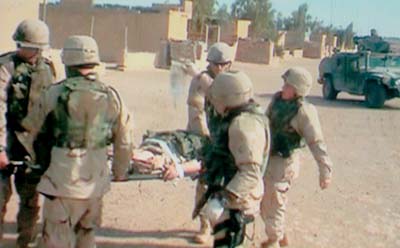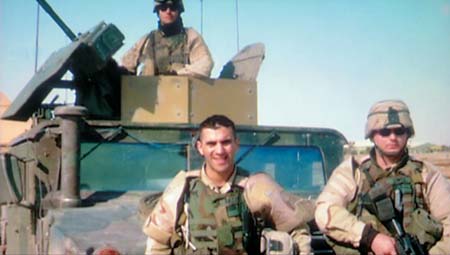 |
 |
| current issue |  |
past issues |  |
send a letter/news |  |
address update |  |
advertise |  |
about us |  |
alumni home |
Features
Witness to WarPage 2 of 3
A soft-spoken 27-year-old UNH senior, Zack Bazzi is usually not inclined to share his war stories. But this spring, he made his film debut--as himself--in a ground-breaking documentary, "The War Tapes," billed as "the first movie shot by soldiers themselves." And suddenly, thousands of people are getting a glimpse of Bazzi's life as a soldier in Iraq.
"It's surreal," he says, "seeing yourself up on a 50-foot screen." But Bazzi is getting used to it. "The War Tapes" won the award for best international documentary at the Tribeca Film Festival in May. And Bazzi has been in the spotlight ever since, doing dozens of interviews, appearing on national television and attending conferences. The film has had screenings in cities across the country. A DVD will be released next year by SenArt Films.

|
For the most part, critics have been generous in their praise, calling it "the first indispensable Iraq documentary" and commending its vivid portrayal of the war. The biggest buzz surrounding the film, though, has to do with the logistics of its creation: Never before have the soldiers themselves been given cameras. This is a war story told not through edited news footage nor as memoir, but in real time, as bombs are exploding.
Bazzi recalls the day the whole unexpected venture got underway. A member of the New Hampshire National Guard, he was in Fort Dix, N.J., preparing for deployment. One day, a civilian stood up and introduced herself in front of the 180 men in Charlie Company, 3rd of the 172nd Infantry Regiment (Mountain). Director Deborah Scranton started talking about how she wanted to make a film--and she wanted the soldiers themselves to do the storytelling. Some were skeptical: Are you for the war or against it? What are your politics? How do we know you won't twist our words? In the end, 10 soldiers, including Bazzi, signed on to the project.
When they got to Iraq, the soldier-filmmakers mounted their video cameras to gun turrets, dashboards and even to their helmets, using duct tape and ingenuity to record their experiences without interfering with their duties. "It was as simple as turning on the air conditioner," says Bazzi. "All I did was push a button when I got into my Humvee. Then I forgot about it."
Meanwhile, the men stayed in touch with Scranton through e-mail and instant messaging. "It was like we were sitting around a virtual campfire," she says, "chatting together in the middle of the night." From her New Hampshire farmhouse, Scranton watched Quicktime files of explosions and ambushes. She talked with soldiers who had just returned from dangerous missions "outside the wire." In some cases, she suggested follow-up interviews when the men were still reeling from harrowing, near-death experiences. Editing final footage--1,000 hours in all--took a full year.
The film has its share of stomach-churning moments--bombs detonating, flesh and blood smeared on the road, an Iraqi woman run down by an American convoy. But part of film's realism comes from its portrayal of the mundane and the tedious. "The overwhelming majority of the time, nothing happens," says Bazzi, describing his days in Iraq. "You're just driving up and down the MSR--that's 'main supply route' in Army lingo--on patrol." Not that it isn't nerve wracking. The men are always on edge, looking for abandoned cars, oil tankers, suspicious piles of trash, anything that could be a hiding a deadly explosive. Most of the time, though, it's pretty quiet. "If the film were a totally accurate portrayal," Bazzi jokes, "it would have been 58 minutes of driving through the desert and two minutes of firefight."

|
Instead, viewers get a tightly edited 97-minute distillation of 16 months of military life--including departure, tour of duty and homecoming. The film focuses on three men. Specialist Mike Moriarty, 34, is a Harley-Davidson mechanic who signed up for service after 9/11. Married with two children, he calls himself "substantially patriotic." Sgt. Steve Pink, 24, a Cape Cod carpenter, keeps a journal of his war experience. And then there's Bazzi, a Lebanese-American college student who loves politics and travel, speaks Arabic and is, he says, probably one of the few men in the unit who did not vote for Bush.
In keeping with the director's commitment to letting the soldiers tell their own stories, the film offers a decided mix of perspectives about the war. While the men are proud of their service, viewers get an earful about Kellog Brown & Root, the military contractor that is a subsidiary of Halliburton. The soldiers crack somber jokes about $28 mess hall plates and supply trucks full of cheesecake, which Bazzi and his colleagues risk their lives to guard. They also debate about money vs. safety, oil vs. democracy, venting their frustrations in moments of surprising candor.
In many ways, Bazzi serves as the moral compass for the film. He describes the insanity of dumping 150,000 troops in the middle of a foreign culture with almost no cultural training. "My language skills were helpful," says Bazzi. "It made me a better soldier and also created understanding for the people we were there to protect." Occasionally, his fluency put him in awkward situations. Like the time an Iraqi man with a sick baby in his arms begged to be allowed to cross the road to reach a hospital. Bazzi's platoon was on guard, their orders were clear, and he had to translate: No one was permitted to cross. The man was desperate. "He wasn't faking," says Bazzi. "It's hard to look these people in the face, and you know they're not insurgents. It's psychologically taxing." Bazzi pauses, then notes the irony of the situation: "We're bringing you freedom--but you can't cross the road."
Page: < Prev 1 2 Next >Easy to print version

